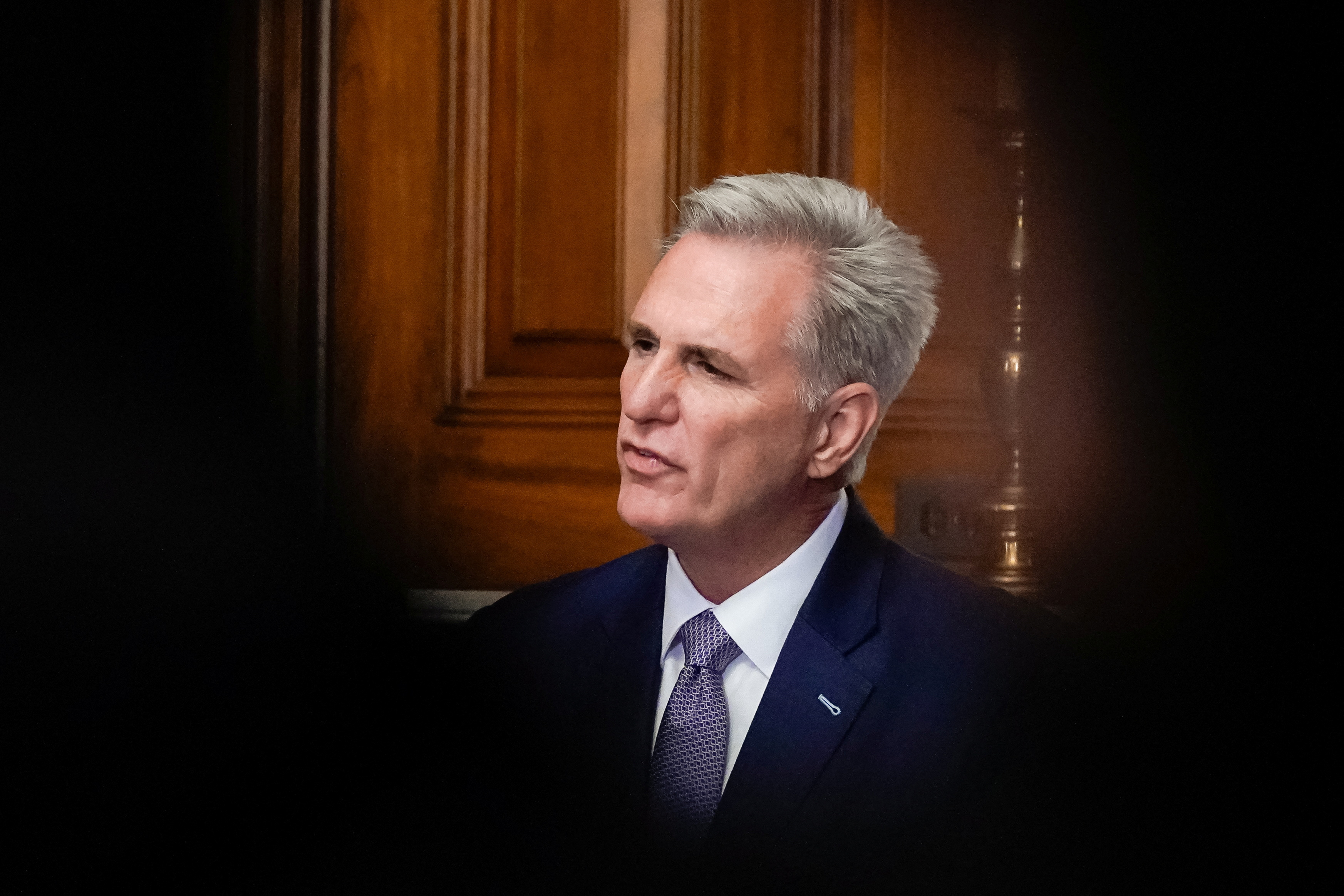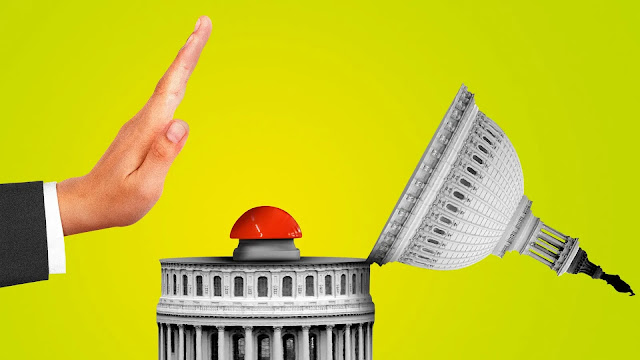(Reuters) - The U.S. Congress passed a stopgap funding bill late on Saturday with overwhelming Democratic support after Republican Speaker Kevin McCarthy backed down from an earlier demand by his party's hardliners for a partisan bill.
The Democratic-majority Senate voted 88-9 to pass the measure to avoid the federal government's fourth partial shutdown in a decade, sending it to President Joe Biden to sign into law before 12:01 a.m. ET (0401 GMT) deadline.
McCarthy abandoned party hardliners' insistence that any bill passes the chamber with only Republican votes, a change that could cause one of his far-right members to try to oust him from his leadership role.
The House voted 335-91 to fund the government through Nov. 17, with more Democrats than Republicans supporting it.
That move marked a profound shift from earlier in the week when a shutdown looked all but inevitable. A shutdown would mean that most of the government's 4 million employees would not get paid - whether they were working or not - and also would shutter a range of federal services, from National Parks to financial regulators.
Federal agencies had already drawn up detailed plans that spell out what services would continue, such as airport screening and border patrols, and what must shut down, including scientific research and nutrition aid to 7 million poor mothers.
"The American people can breathe a sigh of relief: there will be no government shutdown tonight," Democratic Senate Majority Leader Chuck Schumer said after the vote. "Democrats have said from the start that the only solution for avoiding a shutdown is bipartisanship, and we are glad Speaker McCarthy has finally heeded our message."
DEMOCRATS CALL IT A WIN
Some 209 Democrats supported the bill, far more than the 126 Republicans who did so, and Democrats described the result as a win.
"Extreme MAGA Republicans have lost, the American people have won," top House Democrat Hakeem Jeffries told reporters ahead of the vote, referring to the "Make America Great Again" slogan used by former President Donald Trump and many hardline Republicans.
Democratic Representative Don Beyer said: “I am relieved that Speaker McCarthy folded and finally allowed a bipartisan vote at the 11th hour on legislation to stop Republicans’ rush to a disastrous shutdown."
McCarthy's shift won the support of top Senate Republican Mitch McConnell, who had backed a similar measure that was moving through the Senate with broad bipartisan support, even though the House version dropped aid for Ukraine.
[1/7]The U.S. Capitol is seen in the background following the passage of a 45-day continuing resolution at the end of the day on Capitol Hill in Washington, U.S., September 30, 2023. REUTERS/Ken Cedeno Acquire Licensing Rights
Democratic Senator Michael Bennett held the bill up for several hours trying to negotiate a deal for further Ukraine aid.
"While I would have preferred to pass a bill now with additional assistance for Ukraine, which has bipartisan support in both the House and Senate, it is easier to help Ukraine with the government open than if it were closed," Democratic Senator Chris Van Hollen said in a statement.
McCarthy dismissed concerns that hardline Republicans could try to oust him as leader.
"I want to be the adult in the room, go ahead and try," McCarthy told reporters. "And you know what? If I have to risk my job for standing up for the American public, I will do that."
He said that House Republicans would push ahead with plans to pass more funding bills that would cut spending and include other conservative priorities, such as tighter border controls.
CREDIT CONCERNS
The standoff comes just months after Congress brought the federal government to the brink of defaulting on its $31.4 trillion debt. The drama has raised worries on Wall Street, where Moody's ratings agency has warned it could damage U.S. creditworthiness.
Congress typically passes stopgap spending bills to buy more time to negotiate the detailed legislation that sets funding for federal programs.
This year, a group of Republicans has blocked action in the House as they have pressed to tighten immigration and cut spending below levels agreed to in the debt-ceiling standoff in the spring.
The McCarthy-Biden deal that avoided default set a limit of $1.59 trillion in discretionary spending in fiscal 2024. House Republicans are demanding a further $120 billion in cuts.
The funding fight focuses on a relatively small slice of the $6.4 trillion U.S. budget for this fiscal year. Lawmakers are not considering cuts to popular benefit programs such as Social Security and Medicare.
"We should never have been in this position in the first place. Just a few months ago, Speaker McCarthy and I reached a budget agreement to avoid precisely this type of manufactured crisis," Biden said in a statement after the vote. "House Republicans tried to walk away from that deal by demanding drastic cuts that would have been devastating for millions of Americans. They failed."
Top U.S. House Republican Kevin McCarthy could face an untimely end to his role as speaker if party hardliners oust him, for averting a costly government shutdown on Saturday with a stopgap bill that drew more support from Democrats than Republicans.
The Republican-controlled House of Representatives voted 335-91 to adopt a 45-day stopgap measure hours before funding for federal agencies was set to expire. The Democratic-led Senate later approved the same bill with bipartisan support and sent it to President Joe Biden to sign into law.
But soon after the House action, hardline Republican conservatives began targeting McCarthy's role as speaker, claiming he had scored a victory for the "Uniparty" of Washington.
"Should he remain Speaker of the House?" Republican Representative Andy Biggs, a leading hardliner, asked on the social platform X, formerly known as Twitter.
McCarthy decided to bring a vote on a measure that could win Democratic support, knowing full well that it could jeopardize his job. One of his advisers told Reuters the speaker believed some hardliners would try to oust him under any circumstances.
"Go ahead and try," McCarthy said in comments directed at his opponents on Saturday. "You know what? If I have to risk my job for standing up for the American public, I will do that."
The bipartisan measure succeeded a day after Biggs and 20 other hardliners blocked a Republican stopgap bill that contained sharp spending cuts and immigration and border restrictions, all of which hardliners favor.
The Republican bill's failure ended that party's hopes of moving a conservative measure and opened the door to the bipartisan measure that was backed by 209 House Democrats and 126 Republicans. Ninety Republicans opposed the stopgap.
Hardliners complained that the measure, known as a continuing resolution, or CR, left in place policies favored by Democrats including Biden, Senate Majority Leader Chuck Schumer, and former House Speaker Nancy Pelosi.

U.S. House Speaker Kevin McCarthy (R-CA) speaks to reporters in the U.S. Capitol after the House of Representatives passed a stopgap government funding bill to avert an immediate government shutdown, on Capitol Hill in Washington, U.S. September 30, 2023. REUTERS/ Ken Cedeno Acquire Licensing Rights
"Kevin McCarthy put a CR on the Floor that got 209 Democrat votes since it kept in place the Biden-Pelosi-Schumer policies that are destroying the country and the spending levels that are bankrupting us," hardline Representative Bob Good said on X.
Under an agreement McCarthy reached with hardliners to become speaker in January, just one lawmaker can set his potential ouster in motion by moving to "vacate the chair."
Republican Representative Matt Gaetz, who has openly threatened such action, made clear what it would take days before the Saturday vote.
"One thing I know. If Kevin McCarthy uses Democrat votes in the House of Representatives to advance Joe Biden's spending priorities, he cannot remain as the Republican speaker," the Florida Republican told the far-right channel Real America's Voice on Wednesday.
It was not clear what action Democrats might take if a Republican moved to vacate the chair and the House voted on the measure.
Republican Representative Brian Fitzpatrick, who co-chairs the bipartisan Problem Solvers' Caucus, said bipartisanship itself would be the real issue in any vote on McCarthy's future.
"The motion to vacate will come ... and the question will be: are we going to punish or reward leaders who put two-party solutions on the floor? That is squarely the question," Fitzpatrick told reporters.
Some Democrats have suggested they could support McCarthy if an ouster attempt occurred at a turbulent time. Others have suggested they could back a moderate Republican willing to share the gavel with them and allow power-sharing within House committees. Others have shown no interest in helping any speaker candidate aside from House Democratic leader Hakeem Jeffries.
"That's his problem," Democratic Representative Jim McGovern said of McCarthy. "I vote for Hakeem Jeffries for speaker."
"People have asked about making a deal with them. But I'm not a cheap date. I'm an expensive date."



